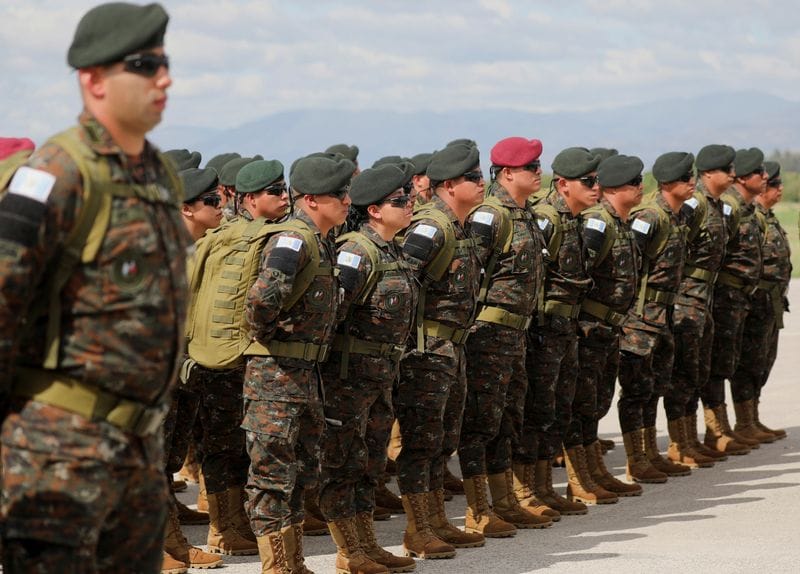Port-au-Prince, Haiti — In a renewed international effort to stabilize Haiti, an additional 75 Guatemalan soldiers have arrived in the capital, Port-au-Prince, to bolster a United Nations-backed mission aimed at countering the rampant gang violence that has paralyzed the Caribbean nation. This second deployment from Guatemala brings the total number of its troops in Haiti to 150, sparking discussions about whether this intervention can effectively restore peace and stability in a country grappling with escalating chaos.
The Deployment: Guatemala Answers the Call
The 75 soldiers, part of Guatemala’s military police unit, landed in Haiti on January 4, 2025, following the earlier deployment of an initial group in December 2024. These troops join a multinational security support mission spearheaded by Kenya and sanctioned by the UN Security Council in October 2024.
El Salvador has also contributed to the mission, recently sending eight of its soldiers. Other nations, including Kenya, the Bahamas, Barbados, Benin, Bangladesh, and Chad, have pledged resources and personnel to combat the spiraling violence.
Colonel Manuel Díaz, leading the Guatemalan contingent, stated, “We are here as part of an international commitment to assist Haiti in restoring law and order. Our focus will be on safeguarding critical infrastructure, protecting civilians, and supporting Haitian authorities in their efforts to rebuild trust and security.”
The State of Haiti: A Nation in Turmoil
Haiti, the poorest country in the Western Hemisphere, has been plagued by chronic instability for decades. The assassination of President Jovenel Moïse in July 2021 further destabilized the nation, creating a power vacuum that emboldened armed gangs.
These gangs now control approximately 85% of Port-au-Prince, according to recent UN estimates. Their grip extends over neighborhoods, major highways, and even critical infrastructure, including police stations and the country’s main international airport. Frequent clashes between rival factions, kidnappings, and extortion rackets have displaced over 200,000 residents and left countless others living in fear.
The humanitarian crisis is deepening, with food insecurity affecting nearly half the population and limited access to healthcare services exacerbating the suffering. International agencies have repeatedly warned that without immediate intervention, Haiti risks descending into a full-blown failed state.
The Role of the Multinational Mission
The UN-backed mission, officially titled the Multinational Security Support Mission (MSSM), is tasked with supporting Haiti’s national police in regaining control over gang-occupied territories. The mission also aims to facilitate humanitarian aid delivery and stabilize the security environment to enable free and fair elections.
Led by Kenyan officer Major General Godfrey Otunge, the MSSM has set its sights on several key objectives:
- Establishing secure zones for displaced civilians and aid organizations.
- Conducting operations to dismantle gang strongholds.
- Training and equipping Haitian police forces to sustain long-term security.
While the mission’s mandate is clear, challenges remain. The absence of a functioning central government complicates coordination efforts, and skepticism among Haitians about foreign intervention persists due to historical grievances.
Guatemalan Troops: A Tested Force
Guatemala’s military police bring experience in counter-insurgency and urban conflict, skills that are expected to be crucial in Haiti’s gang-dominated environments. Analysts believe that Guatemala’s familiarity with addressing violent non-state actors in its own borders equips its troops with a unique perspective.
Dr. Carla Mendez, a security analyst, remarked, “Guatemala’s contribution to the mission reflects a growing recognition in Latin America that Haiti’s instability poses a regional threat. The deployment also underscores the potential for South-South cooperation in tackling shared challenges.”
Local and International Reactions
The arrival of additional troops has drawn mixed reactions within Haiti. Many residents, desperate for relief from violence, have welcomed the international assistance. “We just want to live without fear,” said Marie Pierre, a resident of Port-au-Prince. “If these soldiers can bring peace, we are ready to support them.”
However, skepticism lingers among others who recall past foreign interventions that often failed to deliver sustainable results. Critics have questioned the effectiveness of deploying foreign troops without addressing deeper systemic issues, such as governance, economic reform, and the root causes of gang proliferation.
Globally, the mission has been viewed as a test case for collective international action. The UN has emphasized the importance of a balanced approach that combines security measures with humanitarian and developmental support.
Can the Mission Succeed?
The question of whether the additional 75 Guatemalan troops, alongside the broader multinational mission, can restore order in Haiti remains uncertain. Experts warn that military intervention alone will not solve Haiti’s complex crisis.
“A security-first approach is necessary to create breathing room for governance reforms and humanitarian aid,” said Professor Jean-Louis Denis, a political scientist specializing in Caribbean affairs. “However, the international community must also commit to long-term investments in Haiti’s political and economic infrastructure.”
Looking Ahead
As Guatemalan soldiers take their positions in Port-au-Prince, the world watches to see if this multinational effort can bring about tangible improvements. While the immediate focus is on curbing gang violence and securing humanitarian corridors, the ultimate goal is to lay the groundwork for a stable and self-sufficient Haiti.
For now, Haitians remain cautiously hopeful, their daily lives still overshadowed by uncertainty. As international forces continue their efforts, one pressing question looms: Will this intervention finally pave the way for lasting peace, or will it become another chapter in Haiti’s troubled history?
Only time will tell. But for the 11 million people of Haiti, the stakes have never been higher.
Aslo Read-
1. 2 Babies Diagnosed with HMPV in Bengaluru: Is India Prepared for Emerging Viral Threats?
2. 3 Lives Lost: Could the Coast Guard Helicopter Crash in Gujarat Have Been Prevented?

